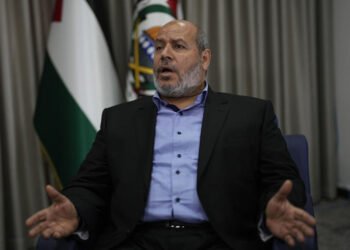Martin Griffiths, the UN Relief Chief, has briefed the UN Security Council on the humanitarian aid situation in Gaza, during a meeting of the council called by Algeria.
He stated that each day that passes only deepens the misery and suffering of people in Gaza and in Israel.
He highlighted the deplorable situation in the besieged enclave.
“14 of the 36 hospitals in Gaza are functional and only partially. They face severe shortages of medical staff and supplies,” he said.
He noted that fierce fighting has continued in the vicinity of Nasser and al-Amal Hospitals in Khan Younis.
“The intense fighting in Khan Younis continues to send thousands of people into Rafah, already hosting over half of Gaza’s 2.2 million people,” he said, adding, “Thus the compression of people in Rafah is a major cause of concern.”
Across Gaza more than 60 percent of housing units are allegedly destroyed or damaged.
“With little public health support available, preventable diseases are rife, will continue to spread, and will become, if they have not already become, the chief killer of Gaza Palestinians…
“The further spread of hostilities southwards along with the increasing deprivation and desperation of people can only be expected to increase the pressure for mass displacement into other countries, the so-called spillover.”
Martin Griffiths
Separately, a report by the UN Conference on Trade and Development (UNCTAD) found that Israel’s campaign in Gaza precipitated a 24 percent contraction in gross domestic product (GDP) and has made the strip “uninhabitable.”
“Unemployment in December rose to 79.3 percent,” it added.
The UNCTAD report also stated that, even if the war ends immediately and Gaza returns to previous growth trends of 0.4 percent each year, pre-war GDP levels will not be restored until 2092.
“The level of destruction from the latest Israeli military operation rendered [Gaza] uninhabitable,” it asserted.
Rami Allazeh, an economist who works on the occupied Palestinian territories at UNCTAD, noted, “I think the main takeaway from the report is that the level of destruction that we’re witnessing in Gaza is unprecedented. It’s going to take a lot of efforts from the international community for the rebuilding and recovery in Gaza.”
U.S Ambassador to the UN says ICJ ruling ‘reaffirms’ U.S stance on Gaza
Also on Wednesday, Linda Thomas-Greenfield, the U.S Ambassador to the UN said that the ICJ ruling is consistent with the U.S approach to Gaza, and that conditions for a ceasefire “do not exist.”
Thomas-Greenfield also stated that the U.S is working to facilitate the delivery of more aid into Gaza, sidestepping reports that Israel has consistently blocked UN aid delivery efforts.
“Some members have argued that the provisional measures ordered by the ICJ are a reason to change course. But in many ways, the court’s measures reaffirmed the framework that we put in place,” she said.
She added that the measures are “consistent with the United States view that Israel has the right to take action in accordance with international humanitarian law.”
The U.S has consistently offered Israel diplomatic support throughout the war, despite growing scrutiny of abuses by Israeli forces and calls for a ceasefire from humanitarian groups.
Meanwhile, South Africa’s Foreign Minister, Naledi Pandor asserted that her country has done everything it can and now it is up to the global community to play its part, to hold Israel accountable.
She also said the United Nations should not just monitor the rulings from places like the ICJ, but enforce them – there should be a greater implementation role rather than the peacekeeping.
South Africa has also approached the International Criminal Court to hold Israeli individuals accountable.
Pandor said that she is concerned by the slow progress, but they are pushing the ICC to do more regarding the prosecutions.
READ ALSO: National Peace Council Commends NDC For Returning To Inter-Party Advisory Committee (IPAC)





















